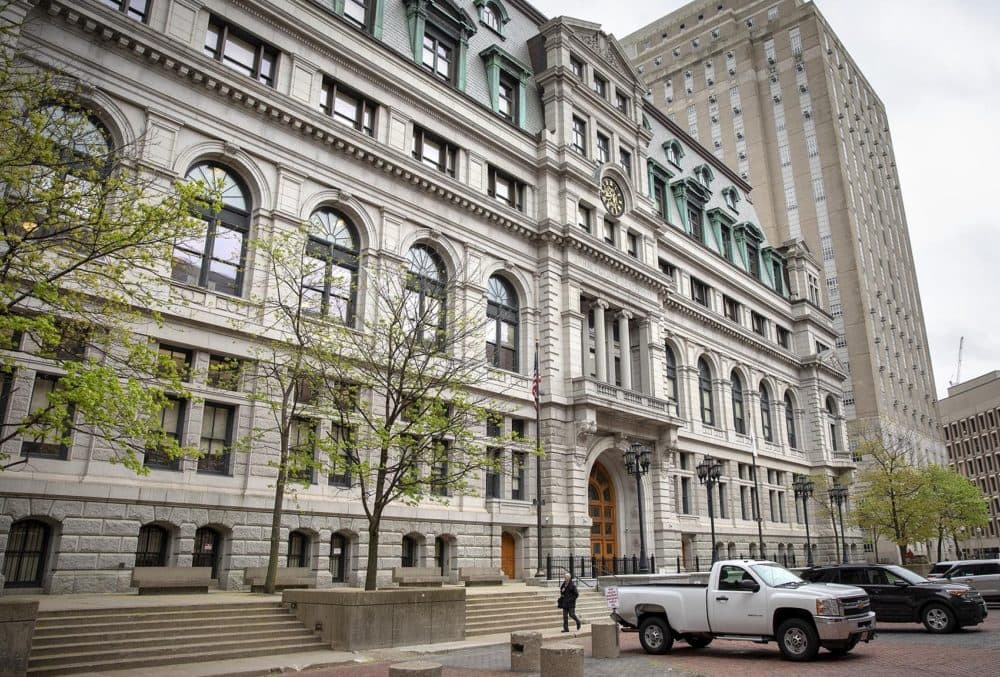Advertisement
SJC weighs discipline against former prosecutors in drug lab scandal

Massachusetts' highest court will consider this week whether three former assistant attorneys general will be sanctioned for their roles in a decade-old drug lab scandal that reverberated throughout the state's criminal legal system.
The state Supreme Judicial Court is scheduled to hear arguments Monday on possible discipline measures for former prosecutors John Verner, Anne Kaczmarek and Kris Foster. The state Board of Bar Overseers, which monitors attorney conduct, has recommended that all three attorneys face sanctions for withholding evidence during the prosecution of Sonja Farak, a former state chemist.
In 2013, Farak was arrested for tampering with and personally using some of the drug samples she was supposed to be testing for evidence when she worked at the state lab in Amherst. She was sentenced to 18 months in prison. The Supreme Judicial Court has tossed out thousands of criminal drug convictions because of questions about the integrity of the evidence Farak was testing.
The three former prosecutors are accused of withholding evidence that indicated that the scope of Farak's drug use at the Amherst lab was larger than the attorney general's office initially claimed and potentially affected even more criminal cases than first believed.
Kaczmarek was the lead prosecutor in the case against Farak. Verner was a supervisor, and Foster was a junior attorney in the office of then-state Attorney General Martha Coakley.
The Board of Bar Overseers has recommended that Kaczmarek be disbarred for failing to turn over "potentially exculpatory evidence," a legal term that refers to evidence that might help a defendant.
The board also recommended that Foster be suspended for one year and a day for indicating the evidence had been turned over when it had not. The board recommended that Verner be suspended for three months for failing to properly supervise the investigation and ensure the evidence was provided to the offices of district attorneys that had prosecuted the affected cases.
In a brief to the court, Assistant Bar Counsel Joseph Makalusky implored the justices to adopt the recommendations, saying the court "is faced with the critical task of restoring some modicum of trust and respect within the public."
"As the Board’s recommendations are the minimum sanctions necessary to protect the public and deter future misconduct, this Court should adopt the sanction of Kaczmarek and adopt, if not increase, the sanctions of Verner and Foster," Makalusky wrote.
Advertisement
Attorneys for all three former prosecutors oppose the recommended sanctions. The recommendations were issued last year after the board reviewed a report from a special hearing officer who held weeks of hearings on how the attorney general's office handled the Farak investigation.
Tom Kiley, an attorney for Kaczmarek, argues that disbarment for his client would be unprecedented. He says turning over potentially exculpatory evidence was a "policy" of the state attorney general's office at the time, but was not part of the official "Rules of Professional Conduct" for attorneys.
"No Massachusetts lawyer has ever been disbarred for violating office policy," Kiley wrote in his brief to the high court.
Kiley also wrote that as a prosecutor, Kaczmarek was required to turn over potentially exculpatory evidence to Farak's defense counsel, not to the district attorneys' offices.
"This Court should also consider the fact that Kaczmarek has already been
subjected to an unofficial sanction due to the publicity and length of these
proceedings," Kiley's brief argued." She has not practiced law for nine years. Disbarring her now for failing to follow rules that did not exist at the time of her acts would be unfair to her and detract from the efforts made by the Court to provide redress to the Farak defendants and improve the system."
Attorneys for both Verner and Foster say Kaczmarek misled their clients and intentionally withheld evidence. They also say a high court ruling will have a broader affect on the legal profession.
One of the questions the justices are expected to consider involves how much responsibility falls on supervising attorneys for the actions of lawyers they oversee. Verner faces suspension for not making sure that Kaczmarek followed the appropriate legal rules. Verner's attorneys say he should receive a public reprimand, but they argue that sanctioning Verner would have an impact on all supervising attorneys.
"The Supreme Judicial Court is called upon by this case to define what constitutes 'reasonable efforts' by a supervisor to ensure that a subordinate lawyer complies with the Rules of Professional Conduct," said Verner's attorney Patrick Hanley, with the law firm Butters Brazilian LLP.
Foster's attorneys argue that she also should receive a public reprimand. They say she was a new lawyer in the state attorney general's office when the Farak investigation began and was following the orders of her supervisors and others in the office.
The board recommended a suspension for Foster — in part citing communications that indicated she had reviewed the Farak materials and thought the relevant evidence had been turned over to the district attorneys.
"She has been singled out, notwithstanding the fact that she was the most junior and inexperienced lawyer who relied on Kaczmarek’s statements, that her assignment was the most limited, and that her reliance was specifically approved
by her supervisors," Foster's attorney Allen David wrote.
The Supreme Judicial Court could rule on the potential sanctions by this summer.
